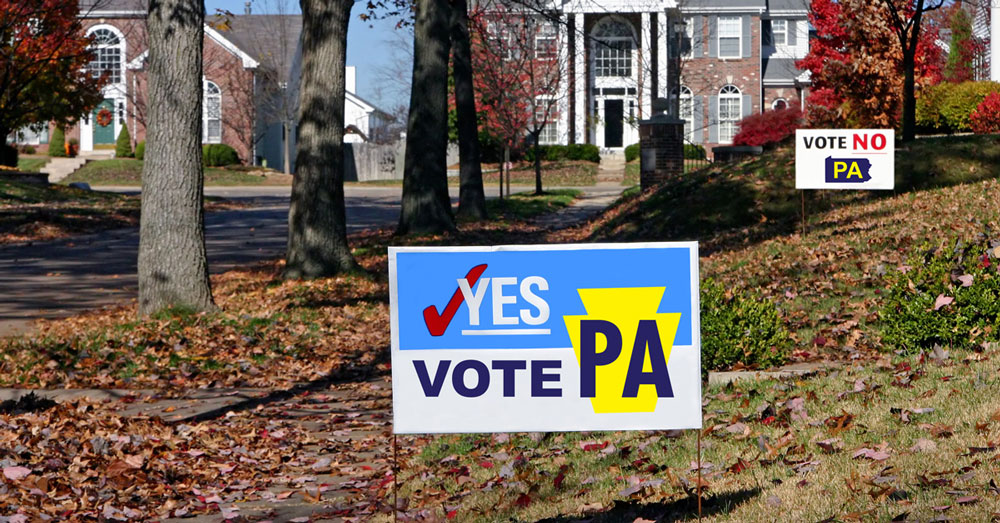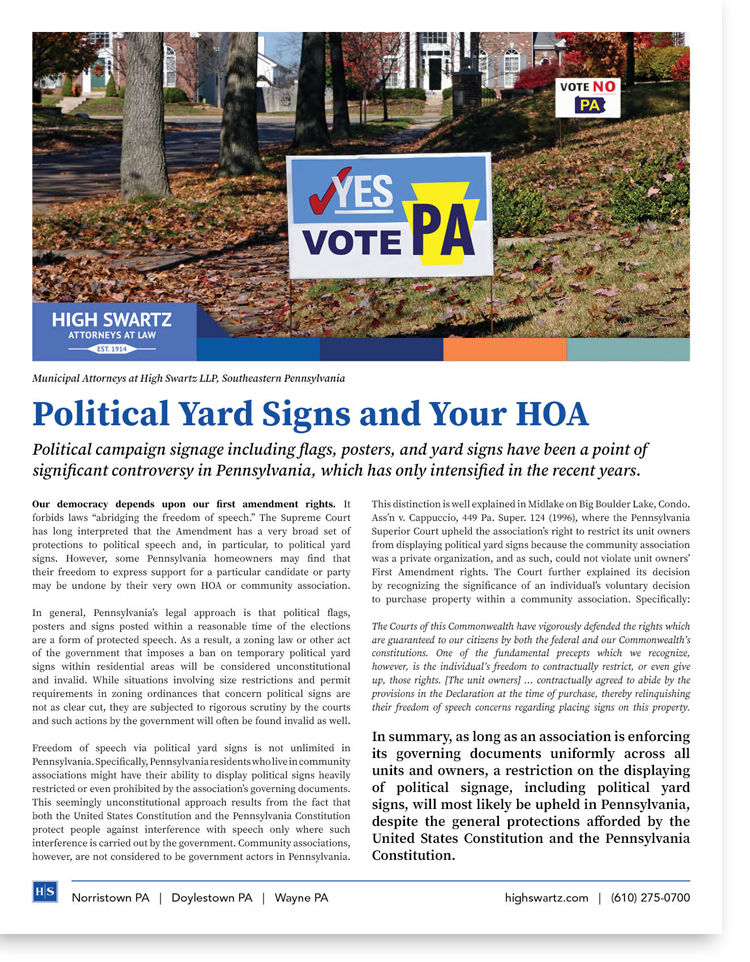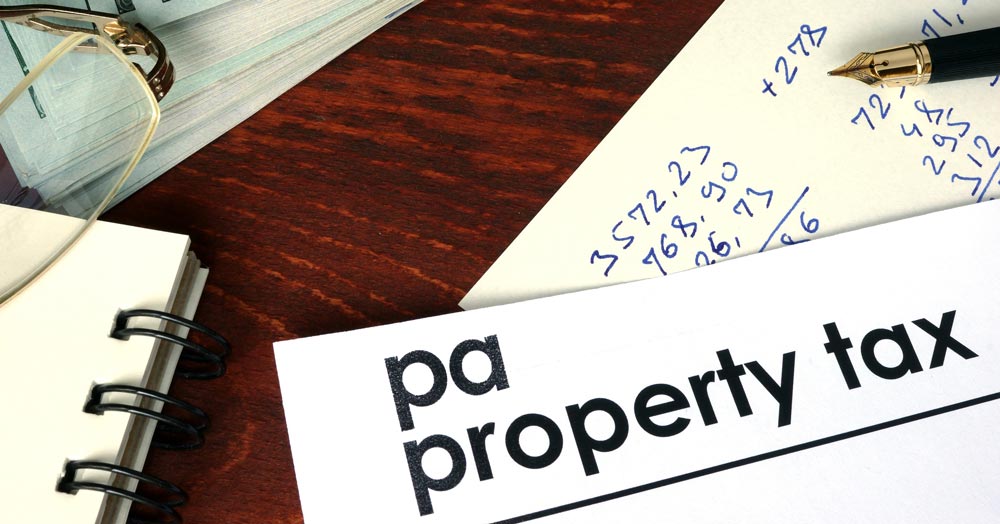Commercial Property Laws in PA - Avoiding Legal Issues
Pennsylvania commercial property laws are strict, whether leasing or owning. Our commercial real estate attorneys can help you avoid legal pitfalls.
Purchasing Commercial Property in Pennsylvania
Let's start with this simple fact. Pennsylvania doesn't mandate a lawyer when buying or selling a commercial property. However, owing to their complexity, a commercial property lawyer is valuable for due diligence and compliance with state laws.
Commercial real estate law requires detailed legal documents. Purchasing a commercial property also requires investing money. Hiring a real estate lawyer can support due diligence on various aspects of the purchase.
Most importantly, they can review the purchase agreement to ensure compliance with local and state regulations. They can also perform title searches and review zoning laws. Legal representation can help identify and mitigate potential risks, negotiate terms, and handle the closing process more effectively.
Our real estate attorneys address commercial laws and residential legal concerns. They focus on metropolitan Philadelphia while supporting clients in Bucks, Delaware, and Montgomery County, PA.
Real estate laws can vary based on your location. So consult with an attorney familiar with potential legal nuances in your area.
Is Pennsylvania a Full Disclosure State for Commercial Property?
With residential real estate in PA, sellers must disclose known material defects of a real property.
However, commercial property transactions operate under the "caveat emptor" principle or buyer beware. The burden generally falls on the buyer to discover property issues.
Based on commercial property laws, sellers don't have to disclose defects. However, they cannot misrepresent the property's condition or engage in deception.
This issue underscores the value of having an experienced commercial real estate attorney. A lawyer can also protect your interests throughout the buying process.
Purchasing Commercial Property in Pennsylvania
Commercial real estate transactions in Pennsylvania involve several critical legal steps to ensure compliance and protect your investment.
One legal consideration is a comprehensive title search. It will uncover any title defects or encumbrances affecting your ownership rights.
Another is an environmental assessment. Meeting state and federal regulations is mandatory, especially in areas prone to industrial contamination.
Leasing Commercial Properties
In Pennsylvania, commercial leases must adhere to specific laws governing the terms and conditions of rental agreements. The lease agreement between the parties primarily defines these terms.
Unlike residential leases, which are governed by the Landlord and Tenant Act of 1951, commercial leases rely on contract law principles.
Potential Legal Issues Surrounding Commercial Properties
The last thing you need with a commercial property, whether you own or lease it, is litigation. Violations can include everything from zoning disputes to rent escalation.
These are some essential considerations in light of Pennsylvania commercial property laws.
Zoning Laws
In Pennsylvania, zoning laws determine how you can use a property. Municipalities enact those laws through the Pennsylvania Municipalities Planning Code. Zoning laws can also extend beyond the code. Most significantly, they can vary from one locality to another.
Zoning governs land use, building heights, density, and the type of buildings allowed on commercial property. They can also specify requirements for parking, signs, and the percentage of the land a building may cover.
Understanding an area's commercial property laws for zoning is essential for potential buyers or developers. Non-compliance can result in costly legal disputes and fines. In the worst case, you may be unable to use the property.
Working with a commercial property lawyer near you who is familiar with local zoning laws is worth the investment.
Title Searches on Commercial Properties
A title search confirms the seller's right to sell the property. It also uncovers title issues, including:
- Property disputes
- False documents
- False identities
- Estate issues
- Property liens
- Code violations
Title searches help prevent future disputes over ownership. They also ensure you receive a clear title. A real estate attorney or a title company can conduct a title search to find issues.
You can get title insurance to protect against losses from property title issues. Unlike home purchases involving a mortgage, insurance isn't mandatory.
Environmental Regulations
Environmental regulations in Pennsylvania play a significant role in commercial property law. Their enforcement protects the environment and ensures public health and safety.
In particular, two pieces of legislation impact commercial properties in Pennsylvania.
The first is the Pennsylvania Clean Streams Law. It regulates the discharge of pollutants into state waters.
The second is the Pennsylvania Solid Waste Management Act. It governs waste treatment and disposal.
Before purchasing a commercial property, you should conduct an environmental assessment. Although not legally required, it affords liability protection.
The assessment, often called a Phase I Environmental Site Assessment, helps identify potential contamination from hazardous substances or petroleum products. Depending on the findings, a more detailed investigation (Phase II) may be necessary.
Failure to comply with environmental regulations can lead to substantial liabilities, including fines and even a loss of property value.
ADA Compliance and Commercial Property Law
Compliance with the Americans with Disabilities Act (ADA) is crucial for commercial properties to ensure accessibility for individuals with disabilities. Compliance includes entrances, restrooms, and parking facilities.
In Pennsylvania, the ADA prohibits private employers with 15 or more employees from discrimination. However, federal laws have no size requirements.
Federal laws allow for fines of up to $75,000 for a first offense. Ongoing non-compliance can lead to additional, more costly penalties.
Property Taxes on Commercial Properties
Property taxes can be a significant cost for commercial real estate owners in PA. They reflect the property's assessed value and can influence leasing rates and investment decisions.
For example, high property taxes might mean higher lease rates, making it more difficult to attract tenants. Property owners can challenge high assessments through appeals to potentially lower their tax liabilities, thereby improving their investment returns.
Commercial Property Law and Financing
In Pennsylvania, you can structure financing for commercial properties using various methods. Each caters to different types of investments and investor needs. An experienced commercial property lawyer working with financial advisors can help determine the best option.
Here's an overview of the most common forms of financing for commercial real estate in the state:
Traditional Mortgages
Traditional mortgages are the most straightforward and commonly used financing for commercial properties. You can access these loans from banks, credit unions, or private lenders. Commercial mortgages generally have terms ranging from 5 to 20 years.
SBA Loans
The Small Business Administration (SBA) offers several loan programs for purchasing or improving commercial properties.
The SBA 504 loan allows long-term, fixed-rate financing for significant fixed assets like land and buildings. You can also use the SBA 7(a) loan program for smaller real estate purchases, but it comes with variable rates.
Bridge Loans
Bridge loans are a short-term financing option. As the name implies, they "bridge" the gap between immediate needs and longer-term financing solutions.
Bridge loans are valuable for buyers needing to move quickly on a purchase before their current property sells. Bridge loans have higher interest rates with shorter terms, typically six months to three years.
Mezzanine Loans
Mezzanine financing is a hybrid of debt and equity financing. If the business doesn't repay the loan on time and in full, the lender can convert it to an equity interest. Because of that risk, you might want to consult with a commercial real estate attorney.
This financing focuses on projects requiring more significant amounts than available through traditional loans. Mezzanine loads often facilitate large-scale developments or acquisitions.
Hard Money Loans
Hard money loans are another alternative, especially for investors looking for quick approvals and funding. The property secures the loan with terms much shorter than traditional mortgages. However, interest rates are higher. Investors often use hard money loans to renovate or reposition a commercial property quickly.
Experienced Commercial Real Estate Attorneys Near You
Our commercial real estate attorneys represent buyers and sellers in metropolitan Philadelphia and surrounding Bucks, Delaware, and Montgomery County. Commercial property laws, particularly zoning, may vary by location.
U.S. News recognized High Swartz as a Tier 1 firm in its Best Law Firm rankings. Best Lawyers in America© also cited several of our firm's real estate attorneys in its 2024 edition.












